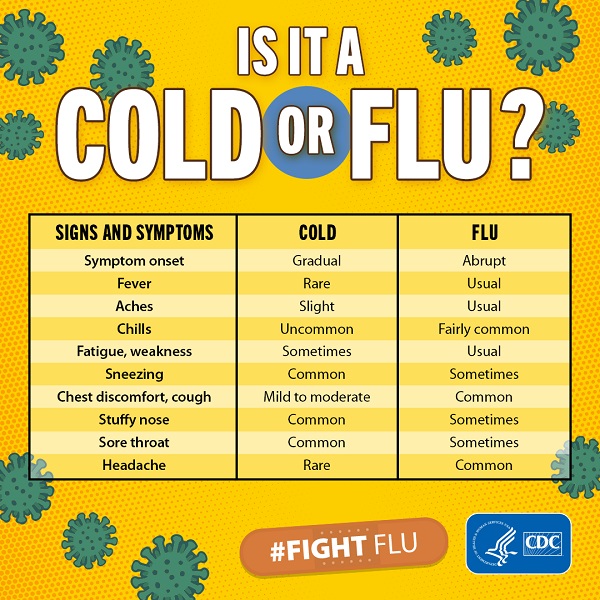Working...


Is it flu or cold symptoms?
How do you know if you have flu or cold symptoms? Take your temperature, say many experts. Flu symptoms often mimic cold symptoms with nasal congestion, cough, aches, and malaise. But a common cold rarely has symptoms of fever above 101 degrees F. With flu symptoms, you will probably have a fever initially with the flu virus and you will feel miserable. Body and muscle aches are also more common with the flu. This table can help determine if you have cold or flu symptoms.
|
Symptoms |
Cold |
Flu |
|
Fever |
Sometimes, usually mild |
Usual; higher (100-102 F; occasionally higher, especially in young children); lasts 3 to 4 days |
|
Headache |
Occasionally |
Common |
|
General Aches, Pains |
Slight |
Usual; often severe |
|
Fatigue, Weakness |
Sometimes |
Usual; can last 2 to 3 weeks |
|
Extreme Exhaustion |
Never |
Usual; at the beginning of the illness |
|
Stuffy Nose |
Common |
Sometimes |
|
Sneezing |
Usual |
Sometimes |
|
Sore Throat |
Common |
Sometimes |
|
Chest Discomfort, Cough |
Mild to moderate; hacking cough |
Common; can become severe |
|
Complications |
Sinus congestion; middle ear infection |
Sinusitis, bronchitis, ear infection, pneumonia; can be life-threatening |
|
Prevention |
Wash your hands often; avoid close contact with anyone with a cold |
Wash your hands often; avoid close contact with anyone who has flu symptoms; get the annual flu vaccine |
|
Treatment |
Decongestants; pain reliever/fever reducer medicines |
Decongestants, pain relievers, or fever reducers are available over the counter; over-the-counter cough and cold medicines should not be given to young children; prescription antiviral drugs for flu may be given in some cases; call your doctor for more information about treatment. |
Usually, the time of year will give you some sense of what you're dealing with. The standard flu season runs from fall to spring of the next year.
When do I call the doctor with flu or cold symptoms?
If you already have flu or cold symptoms, it's important to call your doctor if you also have any of the following severe symptoms:
- Persistent fever: This can be a sign of another bacterial infection that should be treated.
- Painful swallowing: Although a sore throat from a cold or flu can cause mild discomfort, severe pain could mean strep throat, which requires treatment by a doctor.
- Persistent coughing: When a cough doesn't go away after two or three weeks, it could be bronchitis, which may need an antibiotic. Postnasal drip or sinusitis can also result in a persistent cough. In addition, asthma is another cause of persistent coughing.
- Persistent congestion and headaches: When colds and allergies have congestion and blockage of sinus passages, they can lead to sinus infection. If you have pain around the eyes and face with thick nasal discharge after a week, you may have a bacterial infection and need an antibiotic.
In some cases, you may need to get emergency medical attention right away. In adults, signs of a crisis include:
- Severe chest pain
- Severe headache
- Shortness of breath
- Dizziness
- Confusion
- Persistent vomiting
In children, additional signs of an emergency are:
- Difficulty breathing or rapid breathing
- Bluish skin color
- Not drinking enough fluids
- Lethargy and failure to interact normally
- Extreme irritability or distress
- Symptoms that were improving and then suddenly worsen
- Fever with a rash
Can I prevent flu or cold symptoms?
The most important prevention measure for preventing colds and flu is frequent hand washing. Hand washing by rubbing the hands with warm soapy water for at least 20 seconds helps to slough germs off the skin.
In addition to hand washing to prevent flu or cold symptoms, you can also get a flu vaccine to prevent seasonal influenza. Seasonal flu activity in the United States generally peaks between late December and early March. Within two weeks of getting a flu vaccine, antibodies develop in your body and provide protection against flu. Children receiving the vaccine for the first time need two doses delivered one month apart.
Antiviral medicine may also help prevent flu if you have been exposed to someone with flu symptoms.